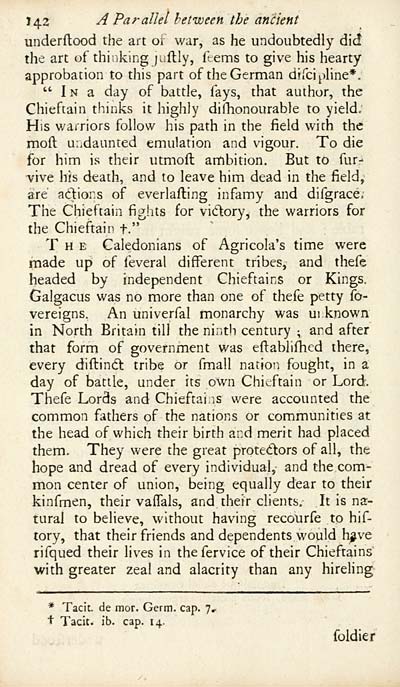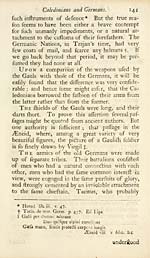Blair Collection > Critical dissertations on the origin, antiquities, language, government, manners, and religion, of the antient Caledonians, their posterity the Picts, and the British and Irish Scots
(180)
Download files
Complete book:
Individual page:
Thumbnail gallery: Grid view | List view

142 A Parallel between the ancient
underftood the art 01 war, as he undoubtedly did
the art of thinking juflly, items to give his hearty
approbation to this part of the German dird^iHne*,
" In a day of batde, fays, that author, the
Chieftain thinks it highly di ("honourable to yieldc
His warriors follow his path in the field with the
moil undaunted emulation and vigour. To die
for him is their utmoft ambition. But to fur-
vive his death, and to leave him dead in the field,
are' adions of everlafting infamy and difgrace.
The Chieftain fights for vidory, the warriors for
the Chieftain t."
T H E Caledonians of Agricola's time were
made up of feveral different tribes, and thefe
headed by independent Chieftains or Kings.
Galgacus was no more than one of thefe petty fo-
vereigns. An univerfal monarchy was ui known
in North Britain till the nir^th century ; and after
that form of government was eftablifhcd there,
every diftindl tribe or fmall natioii fought, in a
day of battle, under its own Chieftain or Lord.
Thefe Lords and Chieftains were accounted the
common fathers of the nations or communities at
the head of which their birth and merit had placed
them. They were the great prote<ftors of all, the
hope and dread of every individual, and the com-
mon center of union, being equally dear to their
kinfmen, their vaiTals, and their clients. It is na-
tural to believe, without having recourfe to hif-
tory, that their friends and dependents would h^ve
rifqued their lives in thefervice of their Chieftains
with greater zeal and alacrity than any hirelings
* Tacit, de mor. Germ. cap. 7,
+ Tacit, ib. cap. 14.
foidier
underftood the art 01 war, as he undoubtedly did
the art of thinking juflly, items to give his hearty
approbation to this part of the German dird^iHne*,
" In a day of batde, fays, that author, the
Chieftain thinks it highly di ("honourable to yieldc
His warriors follow his path in the field with the
moil undaunted emulation and vigour. To die
for him is their utmoft ambition. But to fur-
vive his death, and to leave him dead in the field,
are' adions of everlafting infamy and difgrace.
The Chieftain fights for vidory, the warriors for
the Chieftain t."
T H E Caledonians of Agricola's time were
made up of feveral different tribes, and thefe
headed by independent Chieftains or Kings.
Galgacus was no more than one of thefe petty fo-
vereigns. An univerfal monarchy was ui known
in North Britain till the nir^th century ; and after
that form of government was eftablifhcd there,
every diftindl tribe or fmall natioii fought, in a
day of battle, under its own Chieftain or Lord.
Thefe Lords and Chieftains were accounted the
common fathers of the nations or communities at
the head of which their birth and merit had placed
them. They were the great prote<ftors of all, the
hope and dread of every individual, and the com-
mon center of union, being equally dear to their
kinfmen, their vaiTals, and their clients. It is na-
tural to believe, without having recourfe to hif-
tory, that their friends and dependents would h^ve
rifqued their lives in thefervice of their Chieftains
with greater zeal and alacrity than any hirelings
* Tacit, de mor. Germ. cap. 7,
+ Tacit, ib. cap. 14.
foidier
Set display mode to: Large image | Transcription
Images and transcriptions on this page, including medium image downloads, may be used under the Creative Commons Attribution 4.0 International Licence unless otherwise stated. ![]()
| Permanent URL | https://digital.nls.uk/76288591 |
|---|
| Description | A selection of books from a collection of more than 500 titles, mostly on religious and literary topics. Also includes some material dealing with other Celtic languages and societies. Collection created towards the end of the 19th century by Lady Evelyn Stewart Murray. |
|---|
| Description | Selected items from five 'Special and Named Printed Collections'. Includes books in Gaelic and other Celtic languages, works about the Gaels, their languages, literature, culture and history. |
|---|

